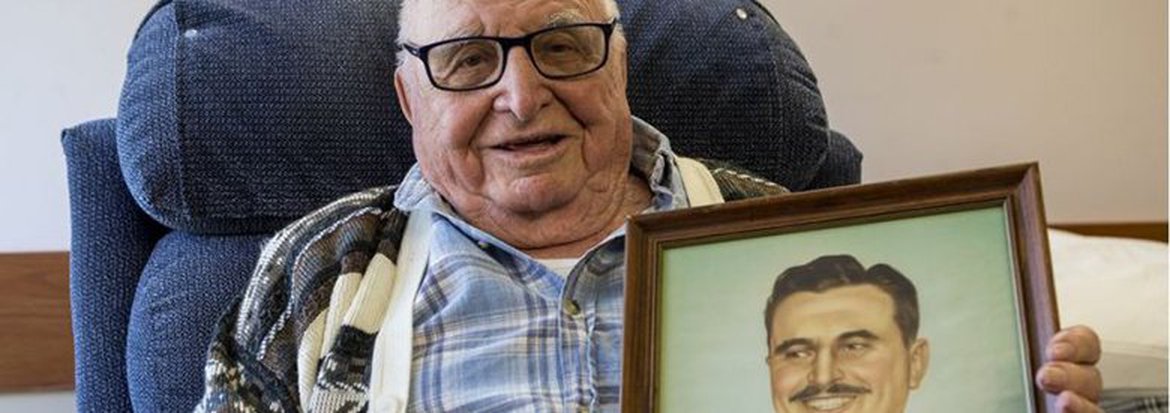Veteran Alex Kowbel typed his way into the military

By ANDREW DUFFY, published November 8, 2019
When the Second World War broke out, “Little” Alex Kowbel desperately wanted to do his part, but he had a hard time convincing recruiters in Melville, Sask., that he was up to the job.
At the time, Kowbel was 17, stood 5’4’’, and weighed 110 pounds. After the air force turned him down flat, he went to the army, but the medical officer there also declined his services. Before he could leave, however, a corporal in the recruiting office noted that Kowbel could type a blazing fast 100 words a minute and said, “I sure could use a typist.” Kowbel would spend the next three decades in the Canadian military, serving in both the Second World War and Korean War.
“And it’s only because I could type that I got into the military,” laughs Kowbel, now a resident at Perley Health. He turned 97 last month.
One of seven children, Kowbel grew up protected from the worst ravages of the Great Depression because his father was a railway mechanic. Alex Kowbel decided that he wanted to be a businessman, so he studied shorthand and typing in high school.
Those skills won him entry into the army, but Kowbel was eager to see action. At Christmas, while alone in the recruiting office, he quietly assigned himself to an artillery unit.
He trained as a bombardier in Winnipeg and with an artillery regiment in Shilo, Man., before being sent overseas in August 1942. Just before D-Day, however, his office skills took him away from his artillery unit: He was appointed administrative staff sergeant and attached to the 2nd Canadian Army Group Royal Artillery (2nd AGRA) headquarters. He landed in Normandy after Juno Beach had been secured and reported for duty just outside Caen, where Canadian forces were involved in a fierce battle for control of the strategic port city.
The Canadian camp was under bombardment at the time; a nearby German ammunition dump had just exploded. “I got into the tent and there was a major sitting underneath a three-by-six folding table and I said, ‘Sgt. Alex Kowbel reporting for duty, sir.’ He said, ‘Get the hell out of here: Go jump in a ditch.’” Kowbel spent the duration of the war moving across Europe with 2nd AGRA headquarters. He returned to Canada after the war and studied commerce and economics at the University of Saskatchewan while attending the Canadian Officers’ Training Corps during the summer months.
While posted to Camp Borden, near Barrie, Ont., he met secretary Frances Matthews at a local dance; they were married in 1948 — the same year Kowbel accepted a full-time commission as an army lieutenant. The following year, Kowbel suffered a broken back in a training accident when a military glider on which he was a passenger crash-landed. He had spinal fusion surgery and spent six months in hospital. After a lengthy recovery, Kowbel was sent to Korea where he became a personnel staff captain. He spent a year in Korea and Japan, during which time his third son, David, was born.
The Kowbels had a fourth child, Susan, several years later, but then tragedy struck: Kowbel’s wife, Frances, died of a brain tumour in March 1960. She was 36. Kowbel scaled back his military career to raise his four young children. “We managed to get along,” he says. Kowbel retired form the military as a major, and went to work in a new government department, Environment Canada, where he helped to lead efforts to eliminate PCBs from electrical transformers. He retired in 1978, and enjoyed cottage life near Foymount and winters in Hawaii. He moved into the Perley in June after suffering a fall.
His military career, he says, was like something out of the TV series, M*A*S*H: “I was kind of like (Cpl.) Radar O’Reilly.”

